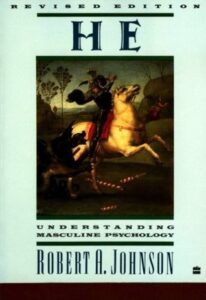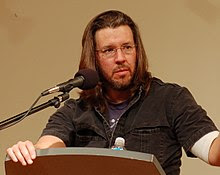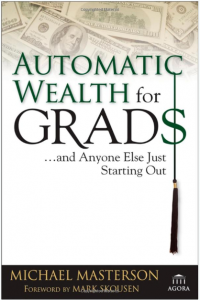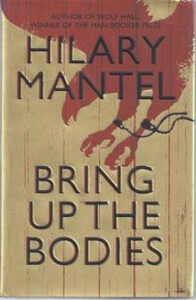
He: Understanding Masculine Psychology
By Robert A. Johnson
83 pages
First published Jan. 1, 1974
It was sitting inconspicuously on the built-in bookcase behind the headboard, along with several hundred other books I brought to Villa Santana about 15 years ago, hoping to one day find the time to read them.
It looked to be about 80 pages. (More of a longish essay than a book.) The yellowed paper gave its age away. Nearly 50 years old.
I was ambivalent about the title: He: Understanding Masculine Psychology. I remembered the name of the author, Robert A. Johnson. But only vaguely. Wasn’t he one of those spiritual hippie writers that were so popular among university students in the 1980s?
On the back cover, there was a blurb summarizing the book’s thesis:
“What does it really mean to be a man? What are some of the landmarks along the road to mature masculinity? And what of the feminine components of a man’s personality? Women have developed, over the centuries, considerable expertise in the technique of adapting to men, and for good reason, but that is not the same as truly understanding them. The transition from male childhood to real manhood is a complicated struggle….”
Beneath that was a paragraph about Robert A. Johnson: A “noted lecturer and Jungian analyst in private practice in San Diego, CA”… “studied Jungian Psychology at the Jung Institute in Switzerland and at the Sri Aurobindo Ashram in India”… “also the author of She: Understanding Feminine Psychology and We: Understanding the Psychology of the Romantic Love.”
It was only 80 pages. And my relationship with the idea of masculinity has been a recurring area of interest in my life. So, I decided to give it a try.
One of my favorite sayings is, “When the student is ready, the teacher appears.” I take it to mean that there are many ideas we encounter growing up that we can’t understand until much later. I always thought it was a quote from Lao Tzu, a must-read (or pretend-to-have-read) ancient Chinese philosopher when I was in college. But I looked it up. Nope. It was not Lao Tzu.
Actually, nobody knows where the maxim came from. But whoever said it was speaking to me. I’ve had that experience of learning something important that I’d read or heard before but ignored at least a hundred times. And I’ve been told by at least a hundred people that something I said or wrote had that effect on them.
He is a book that I feel like I needed to read right about this time in my life. It is a serious book about male psychology – about how boys are made and how easy it is for them to turn out badly. But also how, if they act in accordance with their nature, they can achieve a satisfying equilibrium with nature and an equally satisfying level of wisdom as they age.
What I Liked About It
For such a short treatise, Johnson presents a surprising number of fascinating ideas.
He provides a readable, concise, and convincing analysis of the symbolism in the legend of King Arthur and the Holy Grail. He also offers his own take on how the King Arthur/ Holy Grail mythology highlights important facts about what, at the core, it means to be a boy and a man. And he provides an intriguing introduction to the psychological insights and theories of Carl Jung.
Jung is, or was, considered one of the most important psychological philosophers of the 20th century. Equal to Freud. Yet today, he’s almost forgotten. In He, we get a succinct explanation of Jungian psychology and the Jungian conception of masculinity.
I Was Ready for This Book
In those brief 80 pages, Johnson helped me realize that, at age 72, when I should be well into my wise and settled years, I’m still stuck at a threshold that I should have passed through many years ago. I still haven’t made the transition from the restless, striving, never-satisfied middle years of manhood to the level of maturity that will only come when I stop trying to be so much of a man.
It took me a just a few hours to read He, but it had a strong impact on my thinking about myself.
I recommend it (to both men and women) without hesitation.








